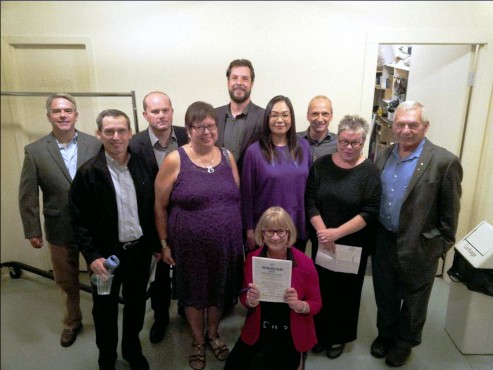The Belfry Theatre is typically known for its numerous play productions, but occasionally the stage spotlight shifts to current events and critical scientific discoveries. On Sept. 21, the Walrus Talks came to Victoria to ignite one such discussion on the topic of water. Sponsored by Labatt, the event welcomed a large audience and featured eight 7-minute TED talk style lectures from Judith Sayers, André Martel, David Schindler, Danika Littlechild, Oliver Brandes, Alanna Mitchell, Rob Williams, and Stephen Leahy.
David Schindler was by far the biggest name of the Walrus Talks. At age 75, he has won 55 national and international science awards and is well established as one of the world’s leading limnologists (inland water scientists). His talk hit close to home, citing southern B.C.’s smoky summer of 2015 as a symptom of climate change.
Schindler also repeatedly singled out the current Canadian government. “[Canada’s leaders] think that this expanding economy on a finite planet and in a finite province is a solution. It’s intractable by the simplest of mathematics . . . They have to be some of the dumbest people on Earth.” Schindler also scolded the B.C. government for their support of hydro power. “It’s a really stupid decision
. . . [Hydro] is one of the most destructive sources of power there is . . . [and] it’s genocide for indigenous people.”
Schindler closed his speech with a concise and powerful statement: “Before we have an Economic Action Plan, we need a Climate Action Plan.” When asked to elaborate, he singled out the Prime Minister. “Stephen Harper says that we’re reducing greenhouse gases. What he doesn’t say is that greenhouse gases have gone down for two reasons. Number one is they were reduced in the province of Ontario, which he’ll turn around and excoriate them for . . . The [second reason] is the economic downturn. If industry drops off, less CO2 is produced — nothing to do with improving the efficiency of those industries — so if there’s an economic pick-up, emissions will be back on the rise.”
Speaking to the Martlet afterwards, Schindler stated that “Western Canada is in deep doo-doo when it comes to climate change . . . Anybody who’s lived in the southern third of B.C. this past summer, I would ask: do you want to breathe air quality like that every summer? Do you want to see that grey sky with the little red sun glowing up there? . . . That’s what’s going to happen . . . if we continue with the business as usual model.”
Stephen Leahy was speaking about his book Your Water Footprint: The Shocking Facts about How Much Water We Use to Make Everyday Products, which exposed the mathematics people tend to ignore when it comes to their daily water usage. For instance, one pound of beef can take up to 5000 litres of water to produce.
Speaking with the Martlet, Leahy revealed that despite his analytical approach to the book, the inspiration to write it came from a visceral, eye-opening assignment in Australia.
“I was living with some Aborigines in their remote camp in the North and we had to go get water from the river every day for everything . . . [The Australian bush] is dangerous, it’s full of poisonous snakes and spiders and even plants that can paralyze you . . . One day the shaman took me to a sacred waterfall to show me where they initiate shamans. The initiation ceremony involves holding onto a couple of big rocks and letting yourself sink to the bottom of the waterfall. You have to stay there long enough to drown. The reason you could become a shaman was because the spirit of the waterfall would judge you worthy, allow you into the spirit world, and then bring you back . . . So [inspiration] came from those two things, the hauling of water and its spiritual dimension.”
Both Leahy and Schindler stressed the importance of keeping science a public priority, with Schindler saying that “if you go to any newspaper you won’t find an environmental column, [and] you’re lucky if you even find a science column . . . it’s really peculiar that the things that are going to matter in this century are not subject to any discussion at all by the public of Canada.”
Leahy echoed this sentiment. “It’s not a question of money because the sports sections are as big as they’ve ever been and the business sections have gotten a lot bigger. It’s a question of choosing priorities. The media owners, which are almost all corporate now, have decided that [science] is not an important topic and are not paying any money to cover it. Until the public start saying, demanding [environmental journalism] it’s not going to change.”







